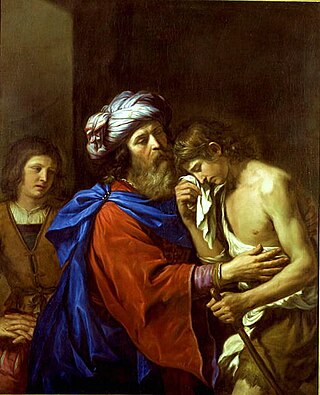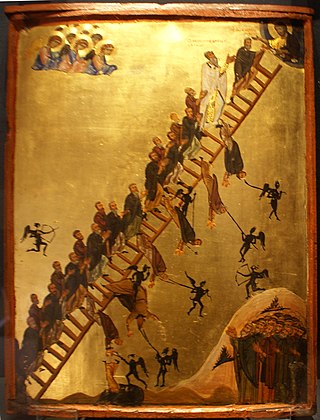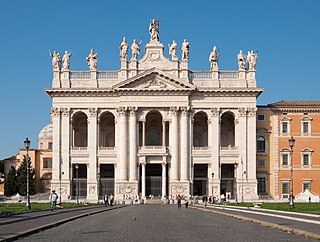Apollinarism or Apollinarianism is a Christological heresy proposed by Apollinaris of Laodicea that argues that Jesus had a human body and sensitive human soul, but a divine mind and not a human rational mind, the Divine Logos taking the place of the latter. It was deemed heretical in 381 and virtually died out within the following decades.

Original sin is the Christian doctrine that holds that humans, through the fact of birth, inherit a tainted nature in need of regeneration and a proclivity to sinful conduct. The biblical basis for the belief is generally found in Genesis 3, in a line in Psalm 51:5, and in Paul's Epistle to the Romans, 5:12-21.

Predestination, in theology, is the doctrine that all events have been willed by God, usually with reference to the eventual fate of the individual soul. Explanations of predestination often seek to address the paradox of free will, whereby God's omniscience seems incompatible with human free will. In this usage, predestination can be regarded as a form of religious determinism; and usually predeterminism, also known as theological determinism.
Salvation is the state of being saved or protected from harm or a dire situation. In religion and theology, salvation generally refers to the deliverance of the soul from sin and its consequences. The academic study of salvation is called soteriology.

Total depravity is a Protestant theological doctrine derived from the concept of original sin. It teaches that, as a consequence of man's fall, every person born into the world is enslaved to the service of sin as a result of their fallen nature and, apart from the efficacious (irresistible) or prevenient (enabling) grace of God, is completely unable to choose by themselves to follow God, refrain from evil, or accept the gift of salvation as it is offered.

In Christian theology, the Harrowing of Hell is an Old English and Middle English term referring to the period of time between the Crucifixion of Jesus and his resurrection. In triumphant descent, Christ brought salvation to the souls held captive there since the beginning of the world.

In Christianity, salvation is the "saving [of] human beings from sin and its consequences, which include death and separation from God" by Christ's death and resurrection, and the justification following this salvation.

In Christian theology, justification is the event or process by which sinners are made or declared to be righteous in the sight of God.

The fall of man, the fall of Adam, or simply the Fall, is a term used in Christianity to describe the transition of the first man and woman from a state of innocent obedience to God to a state of guilty disobedience. The doctrine of the Fall comes from a biblical interpretation of Genesis, chapters 1–3. At first, Adam and Eve lived with God in the Garden of Eden, but the serpent tempted them into eating the fruit from the tree of knowledge of good and evil, which God had forbidden. After doing so, they became ashamed of their nakedness and God expelled them from the Garden to prevent them from eating from the tree of life and becoming immortal.

Limited atonement is a doctrine accepted in some Christian theological traditions. It is particularly associated with the Reformed tradition and is one of the five points of Calvinism. The doctrine states that though the death of Jesus Christ is sufficient to atone for the sins of the whole world, it was the intention of God the Father that the atonement of Christ's death would work itself out in only the elect, thereby leading them without fail to salvation. According to Limited Atonement, Christ died for the sins of the elect alone, and no atonement was provided for the reprobate. This is in contrast to a belief that God's prevenient grace enables all to respond to the salvation offered by God in Jesus Christ Acts 2:21 so that it is each person's decision and response to God's grace that determines whether Christ's atonement will be effective to that individual. A modified form of the doctrine also exists in Molinism.
Theocentricism is the belief that God is the central aspect to existence, as opposed to anthropocentrism and existentialism. In this view, meaning and value of actions done to people or the environment are attributed to God. The tenets of theocentrism, such as humility, respect, moderations, selflessness, and mindfulness, can lend themselves towards a form of environmentalism. In modern theology, theocentricism is often linked with stewardship and environmental ethics or Creation care. It is the belief that human beings should look after the world as guardians and therefore in the way God wants them to. Humans should be considerate to all, from animals to plants to humans themselves. It maintains that human beings are merely here for a short time and should be looking after the world for future generations.

Trinitarian universalism is a variant of belief in universal salvation, the belief that every person will be saved, that also held the Christian belief in Trinitarianism. It was particularly associated with an ex-Methodist New England minister, John Murray, and after his death in 1815 the only clergy known to be preaching Trinitarian Universalism were Paul Dean of Boston and Edward Mitchell in New York.

The history of Catholic Mariology traces theological developments and views regarding Mary from the early Church to the 21st century. Mariology is a mainly Catholic ecclesiological study within theology, which centers on the relation of Mary, the Mother of God, and the Church. Theologically, it not only deals with her life but with her veneration in life and prayer, in art, music, and architecture, from ancient Christianity to modern times.

Ecumenical meetings and documents on Mary, involving ecumenical commissions and working groups, have reviewed the status of Mariology in the Eastern Orthodox, Lutheran, Anglican, and Roman Catholic Churches.

In Christianity, sin is an immoral act considered to be a transgression of divine law. The doctrine of sin is central to the Christian faith, since its basic message is about redemption in Christ.
Christian theology is the theology of Christian belief and practice. Such study concentrates primarily upon the texts of the Old Testament and of the New Testament, as well as on Christian tradition. Christian theologians use biblical exegesis, rational analysis and argument. Theologians may undertake the study of Christian theology for a variety of reasons, such as in order to:

Christian theology sometimes refers to Jesus using the title Redeemer. This refererences the salvation he accomplished, and is based on the metaphor of redemption, or "buying back". In the New Testament, redemption can refer both to deliverance from sin and to freedom from captivity.

In Christianity, heaven is traditionally the location of the throne of God and the angels of God, and in most forms of Christianity it is the abode of the righteous dead in the afterlife. In some Christian denominations it is understood as a temporary stage before the resurrection of the dead and the saints' return to the New Earth.

The Latin Church is the largest autonomous particular church within the Catholic Church, whose members constitute the vast majority of the 1.3 billion Christians in communion with the Pope in Rome. The Latin Church is one of 24 churches sui iuris in communion with the pope; the other 23 are referred to as the Eastern Catholic Churches, and have approximately 18 million members combined. The Latin Church traditionally employs the Latin liturgical rites, which since the mid-twentieth century are very often translated into the vernacular language. The predominant liturgical rite is the Roman Rite, elements of which have been practiced since the fourth century.














